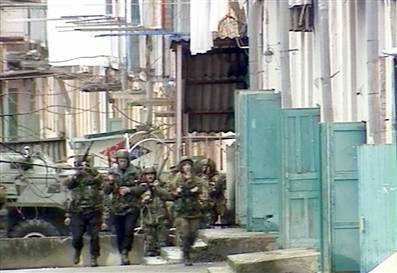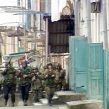
Fifth anniversary of Nalchik raid marked as instability in Kabardino-Balkaria grows
Publication: Eurasia Daily Monitor Volume: 7 Issue: 188
By:

On October 13, a rally took place in Nalchik in commemoration of large scale armed clashes in the city on the same day back in 2005. Relatives of victims from the opposing sides, the police and the insurgents, attended the gathering. An estimated 35 policemen and servicemen, 14 civilians and 92 insurgents died in the October 13, 2005 attack, while 58 alleged rebels are currently on trial on terrorism related charges (www.kavkaz-uzel.ru, October 13).
Despite the fact that the police at the time claimed it was a great success, the situation in Kabardino-Balkaria has not improved since then; on the contrary, it has rapidly deteriorated. Besides numerous attacks on the officials and the law enforcement agents, the first ever rebel attack on a hydroelectric plant in the North Caucasus took place in Kabardino-Balkaria on July 21.
On October 11, a Russian military truck was blown up by an explosive device in Chegem. The attack left three servicemen injured, according to official sources, while the rebel website Kavkaz Center reported deaths. That same day, the head of Nalchik’s crime detection unit was wounded in an attack (www.kavkaz-uzel.ru, October 11). On October 9, an officer of Kabardino-Balkaria’s Supreme Court was killed in an attack in the northern Baksan district, which is currently considered one of the most unstable districts in the republic (Interfax, October 10).
Five years after the attack on Nalchik, Kabardino-Balkarian society is still deeply divided over the causes of those events. On October 12, the Kabardino-Balkarian Human Rights Center published an address signed by its chairman Valery Khatazhukov that blamed the destabilization in the republic on the government’s inappropriate actions. “One to one-and-a-half years before those events [the October 13, 2005 attack] the adherents of an armed jihad comprised only small groups and did not have any significant influence among the Muslims,” the rights activists said. “However, unlawful and unjustifiable oppression against the Muslims, their physical persecution, torture, unlawful detention, searches and shutting down their mosques rapidly radicalized them and strengthened the positions of the forces that preached armed jihad” (https://zapravakbr.ru/newfile_265.htm).
According to the statement, society and the government failed to properly analyze the October 13, 2005 events, which could prevent a further escalation of violence. The rights activists conceded that the authorities initially made some efforts to stabilize the situation in the Muslim community. In particular, the rights activists did not until recently detect mass violations of Muslims’ rights, while the latter received opportunities to defend their rights, including in court. However, since the start of the year, the armed rebels have become galvanized. The statement went on to say that, “explosions, killings of the law enforcement agents [and] increasingly often also of the civilians became part of our daily routine.” Simultaneously the rights activists detected an increase in the number of abductions and extralegal killings of Muslims, as well as illegal detentions and torture. The authors of the statement sternly warned that civil war in the republic was looming. To prevent the worst-case scenario, they offered to start a wide-ranging civic discussion of contentious, terrorism-related issues in order to preclude federal law enforcement agencies from becoming immune to federal and republican laws. The human rights center also supported Kabardino-Balkarian President Arsen Kanokov’s idea of subordinating the police force to him in order to govern the republic properly.
Paradoxically, Moscow does not trust even those very people it appoints directly to rule the regions. It is highly unlikely that President Kanokov will receive any additional powers to fight the insurgents or talk them into submission. The contemporary Kremlin actually appears to be predisposed to tolerate a low-scale civil war across the North Caucasus rather than to give the people a greater right to govern themselves. Thus the conditions in the North Caucasus are increasingly coming to resemble those of a colony governed from abroad.
Meanwhile Moscow has come up with a response to the activism of vis-à-vis the issue of the 2014 Sochi Olympics. The Circassians (aka Kabardins, Cherkess, Adygeis, Shapsugs) launched a campaign against the 2014 Winter Olympics in Sochi, claiming it was the site of genocide, where many of their ancestors were slaughtered or deported by the advancing Russian imperial army. The cause has garnered noticeable support around the globe among the numerous Circassian Diasporas and from neighboring Georgia, motivating the North Caucasian Circassians to make their voice heard as well. So, for the first time, Moscow sponsored the so-called Caucasian Games, which finished in Karachaevo-Cherkessia on October 12 and are scheduled to be held again there next year (www.kavkaz-uzel.ru, October 12).
Moscow generally is wary of supporting any horizontal links among the North Caucasian republics. Only an issue of some urgency, like distracting the Circassians from their aggrieved memories, could have moved Moscow to sponsor the Caucasian Games. However, the situation across the North Caucasus is so explosive that holding the Caucasian Games is unlikely to appease any substantial force in the region.




